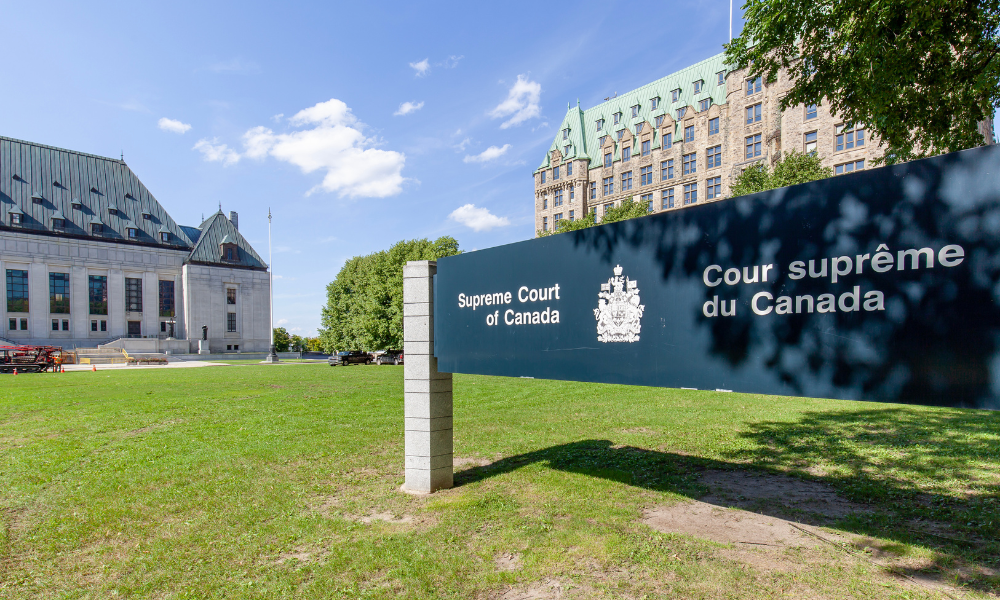
Cases scheduled at federal courts this week involve tax and intellectual property law

This week, hearings scheduled before the Supreme Court of Canada, the Federal Court of Appeal, and the Federal Court included matters relating to criminal law, Charter rights, securities, adverse possession, access to information, and alleged copyright and patent infringement.
The Supreme Court set His Majesty the King v. Wilson, 40990 on Jan. 14, Tuesday. This case arose after police responded to an emergency call where one person in a group of four had overdosed on fentanyl. The respondent was arrested for possession of a controlled substance at the scene.
Upon a search, police found modified handguns, firearm parts, ammunition, and identification papers. The respondent admitted that he owned the guns and the ammunition but not the identification papers. He faced charges for firearm offences, fraudulent impersonation, and possession of identity documents.
A judge admitted the evidence and refused to exclude it for alleged breaches of ss. 8 and 9 of the Canadian Charter of Rights and Freedoms. The respondent was convicted of the firearm offences. The Saskatchewan Court of Appeal allowed his appeal and acquitted him on all counts.
The Supreme Court scheduled Lundin Mining Corporation, et al. v. Markowich, 40853 on Jan. 15, Wednesday. This case arose after the price of the appellant’s securities fell by 16 percent on the Toronto Stock Exchange in late November 2017. The respondent, a shareholder, requested certification of his claim as a class action under s. 5 of Ontario’s Class Proceedings Act, 1992.
The respondent sought leave under s. 138.8 of Ontario’s Securities Act, 1990 to bring an action against the appellant and its officers and directors for their alleged failure to timely disclose certain events that occurred in October 2017. The Ontario Court of Appeal granted the respondent’s motion for leave.
The Supreme Court set Kosicki, et al. v. City of Toronto, Formerly the Corporation of the Borough of York, 40908 on Jan. 16, Thursday. The appellants, who owned a residential property in Toronto, requested an order for adverse possession of a parcel of the city’s land that their predecessors had fenced off and had enclosed into their backyard.
Though the city accepted that the appellant’s evidence met the traditional test for adverse possession, a judge held that private landowners could not acquire title by encroaching on public land and fencing off portions for private use. The Ontario Court of Appeal upheld this decision.
The appeal court scheduled Chad v. Minister of National Revenue, A-333-23 on Jan. 14, Tuesday. In this tax matter, the appellant brought a proposed class proceeding against the Canada Revenue Agency. The Federal Court struck his amended notice of application without leave to amend.
The Federal Court deemed his application so clearly improper as to be bereft of any possibility of success. The court also noted the existence of adequate and effective alternate remedies before the Tax Court of Canada and via the Access to Information Act, 1985.
On appeal, the appellant moved for an order deciding the appeal book’s contents, which should allegedly include a certain affidavit and a transcript of the Federal Court hearing. The respondent opposed and wanted to exclude these documents, with the exception of the appellant’s demand letter.
On Mar. 21, 2024, in Chad v. Canada (National Revenue), 2024 FCA 56, the Federal Court of Appeal issued an order determining that the appeal book should include the documents proposed by the respondent, including the demand letter, to which the amended notice of application had referred.
The court set Maliqi v. His Majesty the King et al, T-1553-23 on Jan. 14, Tuesday. The plaintiff in this case claimed $100,000 in compensatory damages and $60,000 in punitive damages, which allegedly arose from his lawful right to be in Canada from January 2016 to July 2018. The defendants successfully moved to strike his claim.
The plaintiff brought a fresh as amended statement of claim. On Dec. 6, 2024, in Maliqi v. Canada, 2024 FC 1979, the Federal Court struck this filing without leave to amend. It found that the costs award was unsatisfied, that the filing was beyond the limitation period’s expiry, and that there was no cause of action in negligence.
The court scheduled GE Renewable Energy Canada Inc v. Canmec Industrial Inc., T-1471-21 on Jan. 15, Wednesday. The plaintiff in this case asserted ownership of copyright in 33 manufacturing drawings relating to a “butterfly valve.” The plaintiff alleged that the defendant infringed copyright in those drawings.
On Dec. 12, 2024, in GE Renewable Energy Canada Inc. v. Canmec Industrial Inc., 2024 FC 2018, the Federal Court issued a decision denying the plaintiff leave to file Jean Ruel’s reply expert report. But the court granted leave for the plaintiff to file Randall Heeb’s reply expert report and for the defendant to file Alain David’s reply expert report, both of which would serve the interests of justice.
The court set Bayer Inc et al., v. Amgen Canada Inc, T-1919-23 on Jan. 15, Wednesday. The plaintiffs’ statement of claim alleged that the defendant’s making, constructing, using, or selling of a certain drug would infringe claims in Canadian Patent No. 2,906,768 under s. 8.2 of the Patented Medicines (Notice of Compliance) Regulations, SOR/93-133 and s. 54(1) of the Patent Act, 1985.
On Sept. 17, 2024, in Bayer Inc. v. Amgen Canada Inc., 2024 CanLII 117240 (FC), the Federal Court dismissed the motion of the plaintiffs to compel the defendant to produce two bottles each of representative samples of a certain cell culture. The plaintiffs failed to show that the proposed testing had a reasonable possibility of benefiting the judge in this proceeding, the court said.